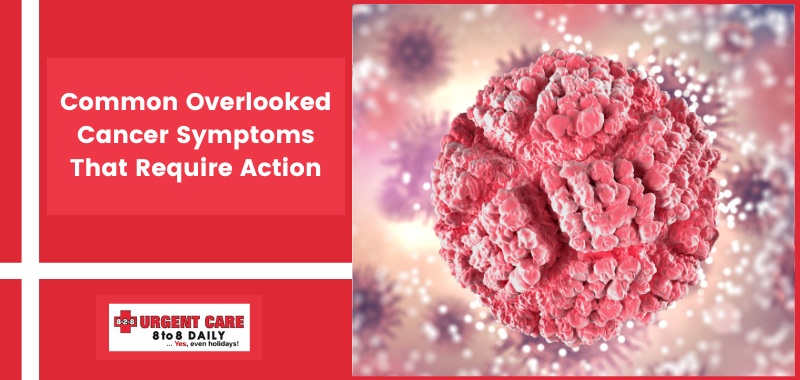


Cancer, a word that sends shivers down our spines, affects millions across the United States. It's a common disease that doesn't discriminate against any age or gender. Cancer is the second leading cause of death in the United States and a worldwide public health issue. According to researchers, 1.9 million new cancer cases will be diagnosed in the United States in 2022, with 609,360 cancer deaths.
Furthermore, for 2023, this estimated number will increase to 2.0 million.
While cancer can come in various forms, one thing that remains constant is the role of early detection. Early detection and treatment can save lives. However, at times, you won’t even know the signs and symptoms of cancer as they might be very common.
This article will guide you through the common signs and symptoms of cancer for both women and men. Stay with us till the end to learn more about cancer.
Breast Cancer
For women, breast cancer is one of the most common types of cancer. Researchers have projected that one in eight women in the United States face the grim possibility of developing it at some point. If a woman has cancer, she might notice a lump or thickening in her breast, changes in the breast's size or shape, nipple discharge (that isn't breast milk), and pain in her breasts.
For early detection and prevention, women must perform regular breast self-exams and schedule mammograms as their healthcare provider recommends.
Ovarian Cancer
Ovarian cancer starts in the ovaries or parts of the fallopian tubes and peritoneum that are close to them. It's the second most common type of cancer in women in the United States. In female reproductive system cancers, ovarian cancer is the leading cause of death.
It often presents subtle symptoms such as bloating, abdominal discomfort, frequent urination, and changes in appetite. These signs are easy to dismiss, but should not be taken lightly. If you experience these symptoms persistently, consult your doctor.
Cervical Cancer
Another commonly diagnosed cancer that starts in the cervix is called cervical cancer. Cervical cancer may not always exhibit noticeable symptoms in its early stages. At the same time, advanced cervical cancer can cause unusual vaginal bleeding or discharge, including bleeding after sex.
Regular Pap smears are essential for detecting abnormal changes in the cervix that could indicate the presence of cancer. Additionally, HPV vaccinations can significantly reduce the risk of cervical cancer.
Related Article: Cervical Cancer: Causes, Symptoms, Treatment and Prevention
Prostate Cancer
After skin cancer, prostate cancer is one of the most common cancers in American men. With age, the chance of getting prostate cancer increases. The possibility of getting this cancer is higher if one or more close relatives are diagnosed with this cancer type.
Some common signs are having trouble urinating, having to go to the bathroom a lot, having blood in your urine or sperm, and feeling pain in your pelvic area. Men over 50, especially those with a family history of prostate cancer, should consider regular prostate screenings. Timely intervention can significantly improve treatment outcomes.
Testicular Cancer
Testicular cancer is relatively rare, but early detection is important. Over the years the incidence rate of testicular cancer has increased in the US.
Common symptoms of cancer in men can include a lump or swelling in the testicle, pain or discomfort in the testicle or scrotum, and a feeling of heaviness in the scrotum. Men should perform monthly self-exams to identify any abnormalities.
Colorectal Cancer
Colorectal cancer is defined as cancer that begins in the colon or rectum. Barring some kinds of skin cancer, colorectal cancer is men’s fourth most common cancer. It is also the fourth leading cause of cancer-related deaths in the United States.
Colorectal cancer can begin without noticeable symptoms. As it develops, it may cause changes in bowel habits, blood in the stool, abdominal pain, and unexplained weight loss. Routine colonoscopies are crucial for early detection, especially for individuals with risk factors such as a family history of colorectal cancer.
Fear, lack of awareness, and busy lifestyles are common reasons individuals might choose to ignore symptoms. Some people don't go to the doctor because they fear being diagnosed with cancer, which can be paralyzing.
Additionally, a lack of awareness about the significance of specific symptoms or their potential connection to cancer can lead to delays in diagnosis. In this fast-paced world, busy lifestyles can also cause individuals to downplay or ignore signs, mistakenly attributing them to stress or exhaustion.
Detecting cancer in its earliest stages offers numerous benefits, including more effective treatment options and an increased likelihood of survival. According to studies, early detection improves the chances of successful treatment and long-term survival.
It is crucial to pay attention to potential cancer symptoms, no matter how subtle they may seem. Regular check-ups and screenings can make all the difference in early detection and effective treatment. Delayed diagnosis can lead to more aggressive forms of cancer and the need for more extensive treatments, often with a lower likelihood of a complete cure.
If you're in Oceanside, CA, and need assistance in early detection, consider visiting 8-2-8 Urgent Care. We offer comprehensive healthcare services, including cancer screenings, to ensure you and your family and friends stay healthy and catch potential issues early. You can also contact 8-2-8 Urgent Care and our staff will walk you through our online check-in from the convenience of your home! Call (760) 216-6253.
Source: American Cancer Society, & CDC